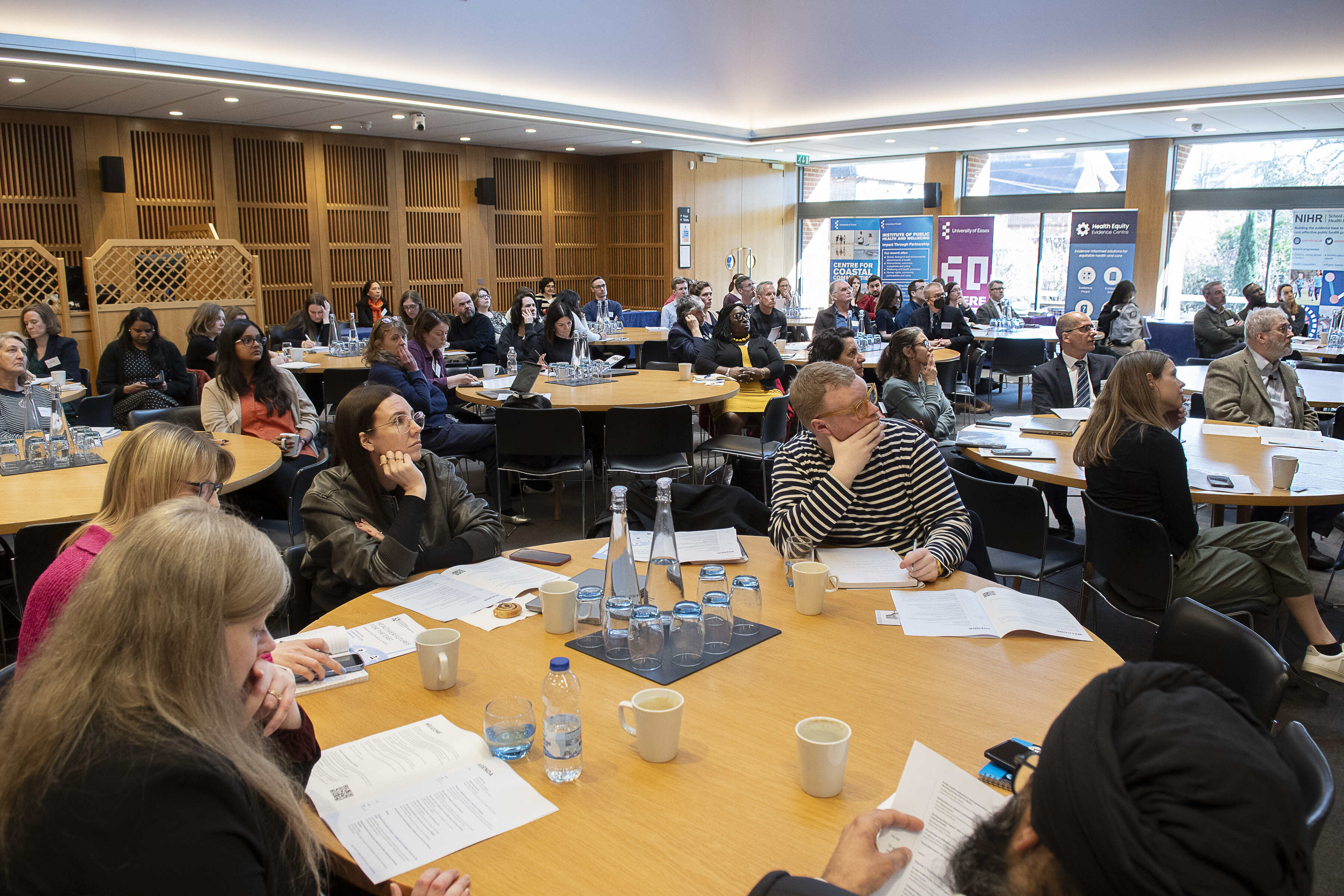We provide the latest updates on public health research initiatives, funding opportunities, fellowship programs, and relevant events across the East of England. Our aim is to keep you informed about important opportunities for professional development and research collaboration within the region, while also showcasing the impactful work of public health professionals. (For further information about public health research funding opportunities in the UK, you are welcome to visit the funding page here.)
Explore the most recent opportunities below and feel free to share them with your colleagues and networks.
On Tuesday, 18 March 2025, PHResH organized Healthier Futures for the East: Research and Practice in Action, a symposium made possible by generous sponsorship from the Health Foundation and strong support from Healthy Futures East. The event brought together public health leaders, academics, funders, and practitioners to examine system-wide regional health challenges, reflect on academic and service collaboration, and adopt a systems approach to drive holistic and integrated public health improvements. Attendees represented both academic and service sectors from across and beyond the East of England.
The symposium opened with welcoming remarks from Professor Aliko Ahmed, Regional Director of Public Health for the East of England (NHS and OHID), who emphasized the importance of collaboration between academia and public health services in addressing health inequalities and challenges using the best available evidence.
The day featured inspiring presentations and discussions among funders, regional public health leads from OHID, the NHS, health infrastructure, as well as academia in system engineering, knowledge mobilization, and evaluation. The morning sessions explored system-wide health challenges, efforts to build evaluation and research capacity, the development of place-based partnerships, and the realization of knowledge mobilization. In the afternoon, the focus shifted toward the new health and care models, highlighting how systems leadership can help identify key issues within complex systems—using CVD prevention as an example—to drive holistic and sustainable improvements. The NIHR ARC East of England also showcased its efforts in applied research and related works in the region.
Professor Mariachiara Di Cesare, PHResH Steering Committee member and Director of the Institute of Public Health and Wellbeing at the University of Essex, closed the symposium by acknowledging the planning committee’s efforts and recognizing former PHResH Director Professor Carol Brayne for her role in establishing the initiative. Looking ahead, Healthy Futures East will build on the symposium’s momentum to strengthen collaboration between academia and public health services.
An impact story and a symposium report is now available here.
Applications are now open for the NIHR Research Support Service (RSS) Specialist Centre for Public Health's Public Health Grassroots Awards. This funding opportunity offers £5,000 to support individuals working in public health roles at the local level to develop research skills and engage with local and national research infrastructure. The award provides flexible, part-time, protected time (typically over 3–6 months) for public health professionals to begin or continue their research journey—no prior research experience is required.
Eligible applicants include those employed by:
-
Local authorities in England, including those in HDRCs (where the applicant is not HDRC-funded)
-
Non-NHS providers commissioned by local authorities
-
VCSEs in England delivering commissioned public health services
A support webinar will take place on Tuesday 13 May 2025, and the application deadline is Thursday 19 June 2025 at 5pm. Funding must commence by 30 September 2025.
For full details and to apply, please read the award description and submit your application form to NIHR.RSS.PublicHealth@newcastle.ac.uk.
The NIHR Public Health Research (PHR) Programme is exploring topics for future commissioned research, including serious violence, advice services, children and young people’s mental health, loneliness, coastal communities, transport poverty, green spaces, and mid-life interventions for healthy aging. Funding calls are tentatively scheduled for Spring 2025 (18 March) or Summer 2025 (8 July), with final dates and details to be confirmed. Would these topics align with your current/upcoming plans?
To address the urgent need for decarbonisation in health and social care, a £25 million funding initiative from NIHR is now open, inviting researchers to collaborate on transformative solutions. Over the next five years, this program will fund innovative projects and enhancements to existing interventions, service models, and care pathways, fostering capacity building and training. With a two-stage application process, this initiative is an opportunity to contribute to the global effort to achieve net zero while improving health outcomes. Applications for the first stage close on 26 March 2025— visit NIHR funding page here to learn more.
The Public Health Research (PHR) Programme is seeking applications to evaluate strategies that reduce the negative health impacts of poor-quality housing. This two-stage commissioned funding opportunity welcomes innovative projects, with Outline Applications due by 25 April 2025. Eligible studies may include SWATs/SWARs (studies within a trial or review) to improve research methodologies. You are welcome to learn more here and complete this online form to join a webinar on 11 February 2025 for guidance on applying, and submit your application.
Applications will soon open for funding to deliver an interdisciplinary project that explores ways to support economic activity in regions of the UK with high rates of ill-health, disability, and informal care. UK-based research organisations eligible for UK Research and Innovation (UKRI) funding are invited to apply, with projects encouraged to include non-academic partners. The total economic cost (FEC) for each project can be up to £1,200,000, with UKRI funding 80% of the FEC. The project must begin by 12 January 2026 and run for 24 months. Please visit UKRI website here for details.
As we enter a new year, it’s an ideal time to explore fresh perspectives for addressing the complex challenges in health and care. The Engineering Better Care Toolkit offers a practical systems approach to improvement, inspired by engineering principles. By integrating systems thinking into regional population health research and addressing barriers of evidence flow, we can better navigate complexity and design interventions that truly meet the needs of our communities. Explore the toolkit to see how this approach can transform health and care in your setting.



